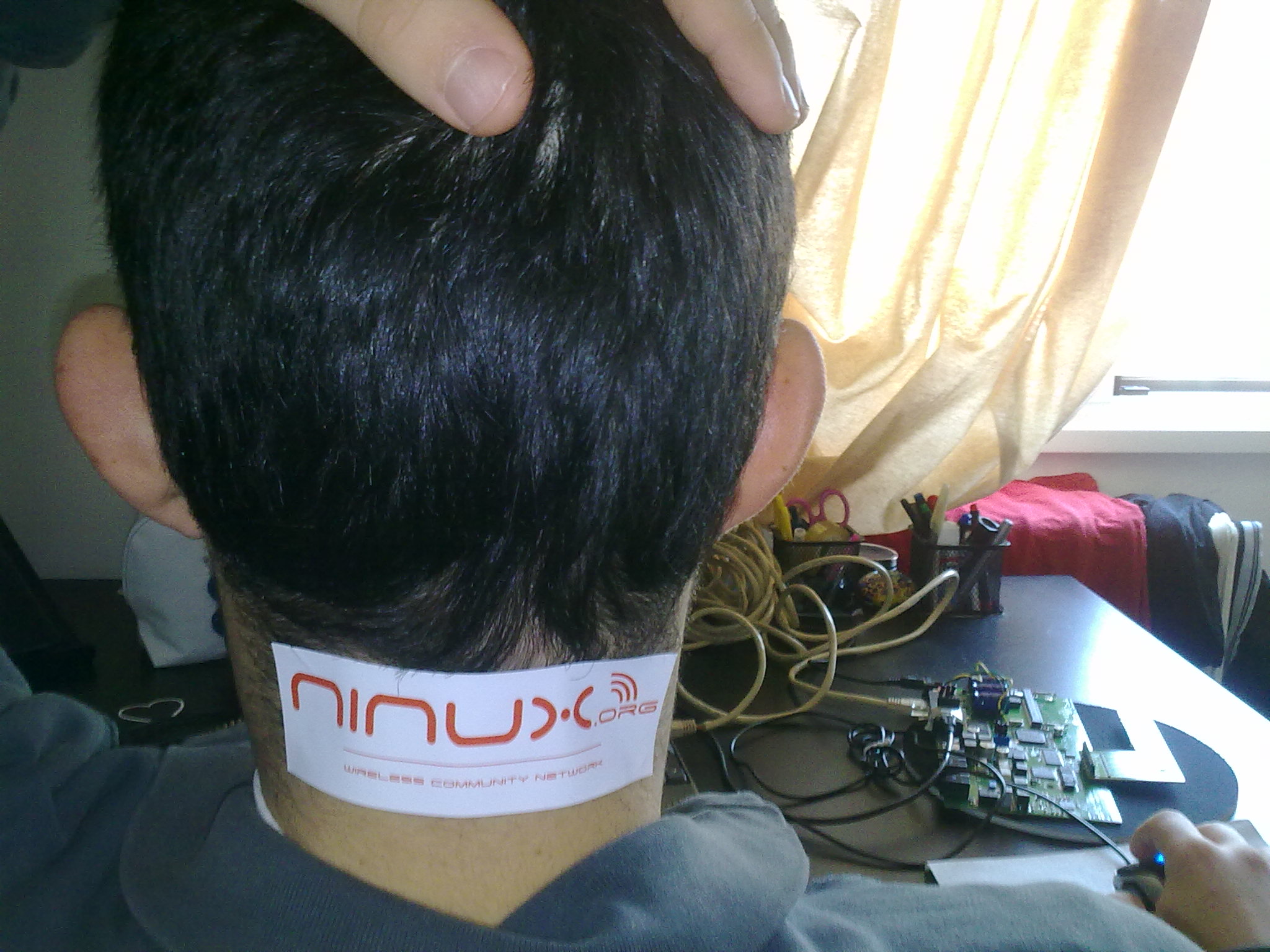Telecom italia agif modem con openwrt
Byte sparsi sull'hack per info contatti @ ninux.org
L'agif ha un soc analog device architettura fusiv v160, il che non è upstream nel kernel ma sul sito di zoobab si è trovato un kernel moddato da cui ho estratto una leggerissima patch di 50MB (http://test.ninux.org/~claudyus/agif/) e il cui lavoro di vivisezione è in corso (vedi mio github)
Boot log:
FUSIV-DIALFACE # printenv author=Leo@analog devices bootcmd=jboot bootdelay=1 baudrate=57600 preboot=echo;echo Type "h" for HELP. Have fun!;echo verify=n bootdelay=1 resetdelay=15 ipaddr=192.168.1.199 serverip=192.168.1.100 ethaddr=00:17:37:da:b1:de netboot=dhcp;tftp;run netargs; bootm nfsargs=setenv bootargs root=/dev/nfs ip=dhcp localargs=setenv bootargs root=/dev/mtdblock2 ip=dhcp addmisc=setenv bootargs $(bootargs) console=ttyS0,$(baudrate) read-only=readonly netargs=run nfsargs addmisc flash_nfs=run nfsargs addmisc;bootm $(kernel_addr) flash_local=run localargs addmisc;bootm $(kernel_addr) netboot_initrd=dhcp;tftp;tftp 80600000 initrd;setenv bootargs root=/dev/ram ramdisk_size=8192 ip=dhcp;run addmisc;bootm 80400000 80600000 rootpath=/export/miniroot-mipsel autoload=no myfs_start=0xbfd40000 kernel_addr=BFC60000 ramdisk_addr=B0100000 u-boot=u-boot.bin bootfile=kernel.img load=dhcp;tftp 80400000 $(u-boot) resetcmd=erase BFF80000 BFFDFFFF ; reset load_kernel=dhcp;tftp 80400000 $(bootfile) update_uboot=tftp 80400000 $(u-boot); protect off BF000000 BF03FFFF; erase BF000000 BF03FFFF; cp.b 80400000 BF000000 $(filesize) update_kernel=run load_kernel;erase BFC60000 BFD5FFFF;cp.b 80400000 BFC60000 $(filesize) initenv=erase BF040000 BF05FFFF stdin=serial stdout=serial stderr=serial ethact=voxEmac Environment size: 1287/131068 bytes U-Boot 1.1.4 for FUSIV chipset by Ikanos(Jun 16 2009 - 15:49:51) CPU: IKANOS Fusiv 160 Family Ethernet Switch hardware reset DRAM: 64 MB Flash: 16 MB *** Warning - bad CRC, using default environment In: serial Out: serial Err: serial Net: voxEmac Type "h" for HELP. Have fun! Hit any key to stop autoboot: 0 getting active image........active image seems to be 0 ## Booting image at bf080094 ... Image Name: openrg_AGIF_1.2.0d-cfif_linux-2. Created: 2009-12-21 14:23:39 UTC Image Type: MIPS Linux Kernel Image (LZMA compressed) Data Size: 2049385 Bytes = 2 MB Load Address: 80010000 Entry Point: 802b7000 CRAMFS start: bf274680 CRAMFS size: 4c0980 Uncompressing Kernel Image ... OK Starting kernel ...
6 febbraio 2011
Praticamente usando la toolchain del livebox2 e compilando il kernel 2.6.15 che in realtà è un 2.6.15-rc5 si ottiene un kernel da 29MB e un po di cavoli
a questo punto si riduce con objbump e si tagga con mkimage
Su uboot ho usato:
setenv bootargs console=ttyS0,57600 rootwait tftp 80400000 kimage.cla
con questi risultati:
FUSIV-DIALFACE #
Using voxEmac device
TFTP from server 192.168.1.100; our IP address is 192.168.1.199
Filename 'kimage.cla'.
Load address: 0x80400000
Loading: #################################################################
#################################################################
#################################################################
#################################################################
#################################################################
#################################################################
#################################################################
#################################################################
#################################################################
done
Bytes transferred = 2993168 (2dac10 hex)
FUSIV-DIALFACE # bootm
## Booting image at 80400000 ...
Image Name: linux-2.6
Created: 2011-02-06 16:05:18 UTC
Image Type: MIPS Linux Kernel Image (uncompressed)
Data Size: 2993104 Bytes = 2.9 MB
Load Address: 80010000
Entry Point: 802b7000
CRAMFS: inside this imageinsomma davvero deludente.
Anche con load/entry adress come da kernel originale non cambia nulla.
se volete provare kernel e kimage sono su http://test.ninux.org/~claudyus/alice_agif
7 febbraio 2011
OPENWRT is cooming
Ok ci siamo, dopo 3 gg di intenso lavoro ecco il primo repository per ikanos: http://test.ninux.org/~claudyus/alice_agif/openwrt/
Testare il kernel
Per testare il kernel scaricato dal link di sopra si deve taggare per uboot, usando mkimage puoi usare questo comando:
mkimage -A mips -T kernel -C none -a 0x80010000 -e 0x802b7000 -n linux-2.6 -d vmlinuz kimage.cla
Il che genera un file, kimage.cla, che è possibile trasferire via tftp sulla scheda come mostrato nell'aggiornamento del 6 febbraio.
8 febbraio 2011
Nulla è stato tentato oggi.
Avvolte per chiarirsi le idee su di un problema è meglio distaccarsene...

10 febbraio 2011
Il progetto freetz ha un kernel molto interessate alla versione 2.6.19.2 con supporto per adi_fusiv ma non compila er vox160, all'interno del progetto è usato per vox180...
Intanto l'ho messo al solito indirizzo, un passo avanti.
Ora un passo indietro... parlando con Florian forse è uscito un problema con la ethernet.
Hello Claudio, On Thursday 10 February 2011 10:07:23 Claudio wrote: > Hi all, > someone of you is know or is part of http://freetz.org/ project? > I found a alicegate [1] variant [2] in italy that is based on fusiv > chip, the chip support is not upstream but downloading freetz sdk I > found a patched kernel 2.6.19.2 that can be a start point to develop > this paltform. > > Other boards are based on same chip, in france livebox and in belgium bbox2 > [3] Keep in mind that just like Broadcom BCM63xx, you might be able to get the basic board support in a working state (CPU handling, UART, USB ...) but the DSL remain as blobs, ethernet might as well. Note that you can also find support for the Ikanos Fusiv DSL platform here: http://www.livebox- opensource.com/Products/LiveBox/LiveBox1.2/Thomson/vR7298/linux-2.6.12.tar.bz2 The Ikanos Fusiv platform uses a Lexra CPU, which is a MIPS compatible clone, excep that it lacks support for 4 patented instructions, so a patched toolchain is required to build a working kernel.
ethernet driver as blobs?!?!?!? MEGA FAIL
E un passo avanti ancora:
pog2 dal forum http://forum.zibri.org ha estratto il kernel dalla flash l'ha taggaro e ricaricato in ram e, NOTIZIA, ha scritto qualcosa sulla seriale!








